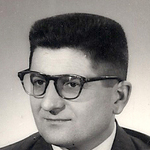
Vladeta Vučković was the first Serbian modern logician, in the real sense of that word. After graduating as a mathematician from the Faculty of Mathematics in Belgrade, Vučković continues his work in the area of mathematics and in 1953 he defends his doctoral dissertation on the topic of mathematical analysis, under supervision of Vojislav Avakumović. Seven years later, in 1960, he becomes a professor at the Faculty of Mechanical Engineering. That year he attends the meetings of the Praxis group where he meets some of the leading philosophers in Serbia and Yugoslavia of the day. He was self-taught on the topic of mathematical logic. He worked on the topic of computability theory for which he also gave lectures at the Faculty of Philosophy in Belgrade in 1962. Besides post-graduate students from the Faculty of Mathematics, the lectures were also attended by Svetlana Knjazeva and Aleksandar Kron. He went to the University of Notre Dame, USA, in 1963.
Vučković’s first publication in the area of logic, entitled Partially ordered recursive arithmetic represents an interesting variation to Goodstein’s equation calculus, which permits primitive-recursive definitions and allows to prove a large number of statements of elementary arithmetic.
Only a year after his first publication in the area of logic, Vučković publishes an extensive and original study Rekursive Wortarithmetik. In many aspects, the study contains the essence of many of his later works.
Vučković offered a generalization of the previous results in the work entitled "On some possibilities in the foundations of recursive arithmetic of words". Vučković succeeded in showing that characteristic function of word equality is primitive-recursive and that certain form of induction, labeled condominium induction by Vučković, with minimal assumptions.
A few years later, Vučković investigates certain variation of the term retraceable set, which was introduced by Jacob Dekker and John Myhill.
Vučković’s student John Berry additionally generalized those results. He investigated the classification of retraceable, regressive, immune, hyper-immune, almost recursive, almost semi-recursive and other sets, in detail. He also proved certain relations between two last classes and well known classes which precede them.
Vučković’s work Creative and weakly creative sequence of r.e. sets offers an alternative definition of John Cleave’s class of creative sequence of semi-recursive sets. Vučković’s student Adrian Carpentier from the University Notre Dame expanded standard definitions of effective inseparability, universality, etc. to twofolds creative sequences using Vučković’s results.
Yet another student of Vučković, Thomas Payne achieved significant results that characterize creative sequences class, investigating the theory of so called finished sequences by Анатóлий Ивáнович Мáль¬цев.
In his later works, Vučković develops the idea of recursive manifolds, first formulated by him in 1973 in the work entitled Local recursive theory. In brief, recursive manifold is comprised of a set together with the appropriate structure, which is effective in a certain manner. Besides investigating the “local” structure of recursive and semi-recursive manifold, Vučković uses category theory tools, which enable him to investigate “global” properties of the semi-recursive manifold REM category.
Although Vučković’s works are essentially from the theory of computability, he managed to interestingly connect them to other areas of logic.
Besides work strictly related to logic, Vučković was familiar with topics that characterized then present discussions on the foundations of mathematics. For instance, in the discussion text published 1963, Vučković manages clearly and in a knowledgeable way point to the most important elements of philosophy of mathematics. Vučković concisely presents three main schools of foundations of mathematics: logicism of Frege and Russell, intuicism of Brouwer, and formalism of Hilbert. He also points out the philosophical importance of certain results of logic. Examples are Gödel’s incompleteness theorems and their effect on Hilbert’s program, Gentzen’s proof of consistency of Peano arithmetic. Löwenheim-Skolem theorem and so called Skolem’s paradox, Church-Turing’s thesis and the concept of computable function. Those familiar with contemporary literature in the fields of philosophy of mathematics realize that the points he raised almost half a century ago are still topical.
Vučković’s bibliography:
1. Vučković V., Partially ordered recursive arithmetics, Mathematica Scandina¬vica, Vol. 7, 1959.
2. Vučković V., „Einführung von Sigma (x) und Pi (x) in der rekursiven Gitter punkt arithmetik“, Doklady Bolgarskoj Akademija Nauk., Vol. 6, 1962.
3. Vučković V., Rekursive Wortarithmetik, Publications de l’Institut Mathéma¬tique, Vol. 14, 1960.
4. Vučković V., On some possibilities in the foundations of recursive arithmetics of words, Glasnik Matematičko¬Fizički i Astronomski (Series II), Vol. 17, 1962.
5. Vučković V., Al most recursive sets, Proceedings of the American Mathematical Society, Vol. 23, 1969.
6. Vučković V., Creative and weakly creative sequences of r.e. sets, Proceedings of the American Mathematical Society, Vol. 18, 1967.
7. Vučković V., Recursive and recursively enumerable manifolds I, Notre Dame Journal of Formal Logic, Vol. 18, 1977.
8. Recursive and recursively enumerable manifolds II, Notre Dame Journal of Formal Logic, Vol. 18, 1977.
9. Vučković V., Local recursive theory, Notre Dame Journal of Formal Logic, Vol. 14, 1973.
10. Vučković V., Recursive and recursively enumerable manifolds II, str. 397.
11. Vučković V., Rekurzivni modeli nekih neklasičnih iskaznih računa, Filozofija, Vol. 4, 1960.
12. Vučković V., Filozofski aspekti istraživanja o osnovama matematike, Filozofi¬ja, Vol. 1, 1963.
Vučković made Duplikationen, a parody to the journal
Publications de l’Institut Mathématique.
Author: Senka Milošević